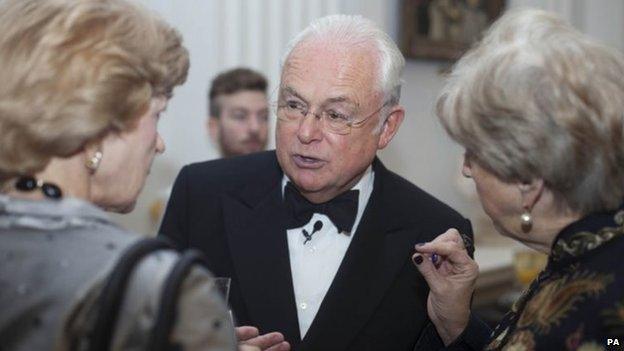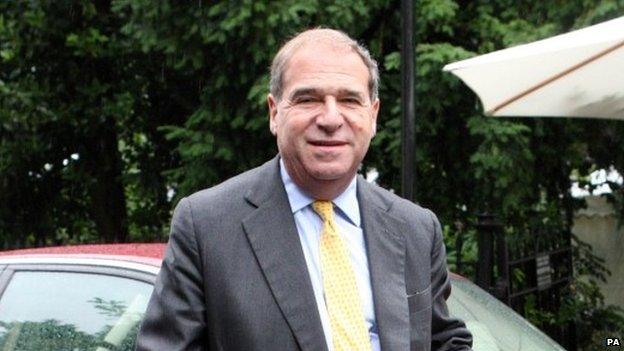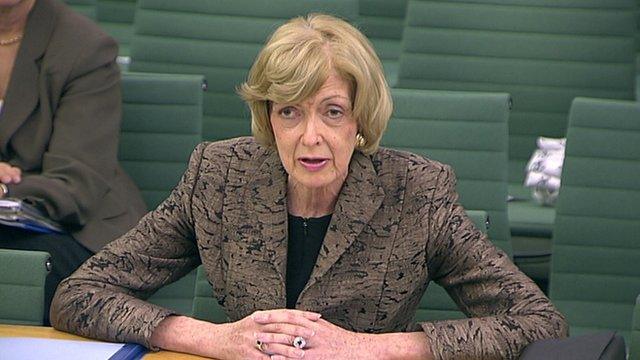Fiona Woolf: Fresh questions for head of abuse inquiry
- Published

Fiona Woolf, left, and and Lady Brittan, right, speak to ex-BBC newsreader Martyn Lewis last October
The head of the public inquiry into historical sex abuse is facing further questions over her suitability from the Home Affairs Select Committee.
In a letter, MPs have asked Fiona Woolf to clarify details about her links with ex-Home Secretary Lord Brittan, whose office handled 1980s abuse claims.
It emerged on Wednesday that a list she gave to MPs of meetings with Lord Brittan and his wife may be incomplete.
Meanwhile, an abuse victim is legally challenging Mrs Woolf's impartiality.
The inquiry, announced in July, will look at whether public bodies and other institutions did enough to protect children from sexual abuse, from 1970 to the present day.
'Enormous detail'
Downing Street has said it has "full confidence" in Mrs Woolf being able to carry out the inquiry, and Home Secretary Theresa May said she had had "a long and distinguished career throughout which she has demonstrated the highest standards of integrity".
Mrs Woolf, who is currently Lord Mayor of London, confirmed on Tuesday she lived in the same London street as Lord Brittan and had invited him and his wife to dinner on three occasions, and had two dinners at their house between 2008 and 2012.

Mrs Woolf had dinner with Lord Brittan and his wife on five occasions
She also said the last contact she had, external had with Lady Brittan was in April 2013, when they met for coffee at Lady Brittan's house.
A photograph on the official website for the Lord Mayor's Dragon Awards, external then emerged, showing her talking with Lady Brittan and the veteran journalist Martyn Lewis, all of whom were judges on the awards panel in October 2013.
When she appeared before the Home Affairs Committee of MPs on Tuesday, Mrs Woolf said Lord Brittan was "one of thousands of people" she knew and not a "close associate".
Committee chairman Keith Vaz said he was "surprised" the meeting at the awards ceremony had not been included in Mrs Woolf's original letter.
But he added: "She gave enormous detail, much more detail than any of us could have given about meetings that took place before."
Mr Vaz has set out 10 questions for her to answer, including whether there were more meetings with Lord and Lady Brittan and whether the judicial review action will delay the inquiry.
He has also asked how Mrs Woolf plans to increase her knowledge of child abuse after her admission that she has no experience of dealing with the issue.
'Completely independent'
Mr Vaz said there should have been more consultation with Parliament and victims' groups before Mrs Woolf's appointment.
He added: "This is not the home secretary's finest hour."
Some MPs have also called for Mrs Woolf to step aside, and Labour has said she should meet abuse victims to address their concerns.
Lord Brittan was home secretary in 1984 when ministers were handed a dossier on alleged high-profile paedophiles.
Mrs Woolf was appointed after the government's original choice, Baroness Butler-Sloss, stepped down after victims' families expressed concerns about her independence.
Deputy Prime Minister Nick Clegg said the Home Office had done "due diligence" before Mrs Woolf's appointment.
He told LBC Radio: "And I haven't heard anything yet that suggests to me the Home Secretary has made the wrong decision."
David Cameron's spokesman said it was important people had faith in the inquiry and that the prime minister looked forward to Mrs Woolf leading its work.
Speaking on the BBC's Newsnight, former child protection manager Peter McKelvie said he did not think abuse victims would have faith in the inquiry.
He said: "There is just no trust in the whole process, from the appointment of Butler-Sloss up to the appointment of Fiona Woolf, because the one thing survivors wanted this time was a completely independent inquiry not led by anyone who they perceived to be a member of the establishment."
- Published22 October 2014

- Published1 December 2015
